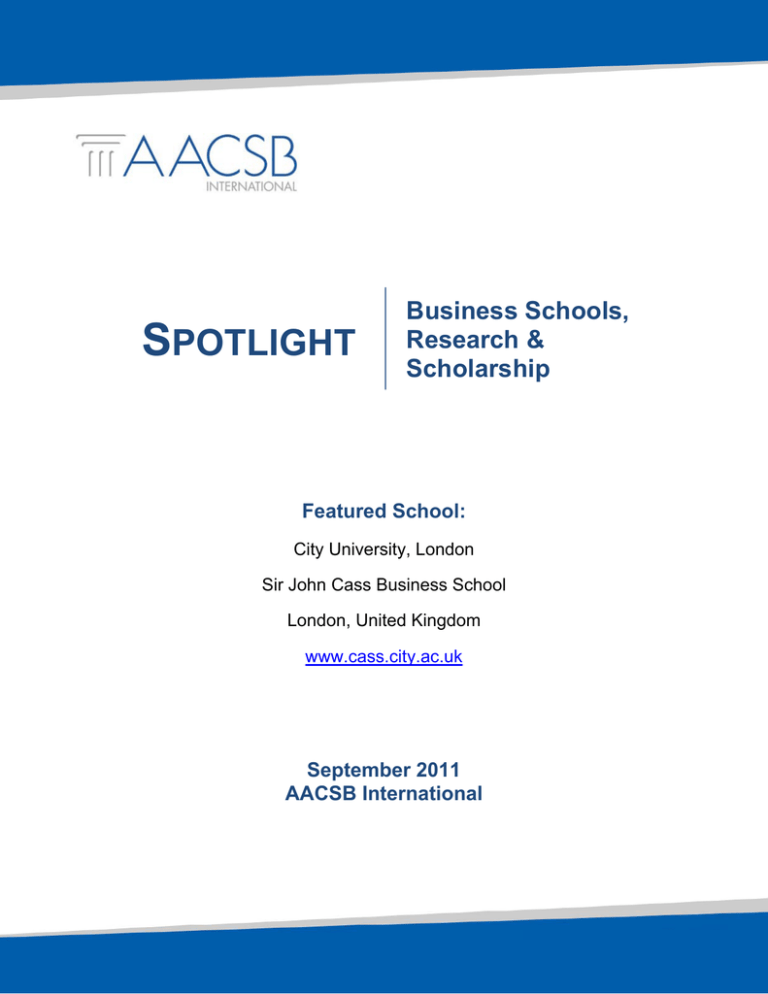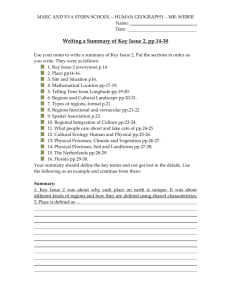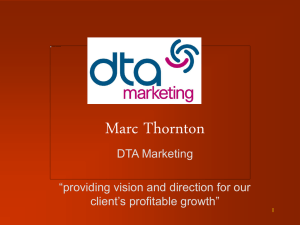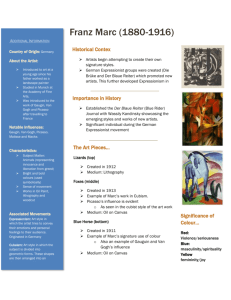
SPOTLIGHT
Business Schools,
Research &
Scholarship
Featured School:
City University, London
Sir John Cass Business School
London, United Kingdom
www.cass.city.ac.uk
September 2011
AACSB International
SPOTLIGHT | Business Schools & Research/Scholarship
City University, London | 2
The Mergers & Acquisitions Research Centre
The Cass Business School at City University in London is well-known for its research, with more than a
dozen research centers featuring a wide variety of topical areas.1 One that is particularly unique to Cass
is the Mergers & Acquisitions Research Centre (MARC), which is focused on developing and
disseminating research on the global mergers and acquisitions (M&A) industry. According to Scott
Moeller, Professor in the Practice of Finance and Director of the MARC, it is the first and still the only one
of its kind at a major global business school.
Professor Moeller came to the Cass Business School in 2003 after nearly two decades in the investment
banking industry.2 He developed a course on M&A that quickly became the most popular elective at the
school in both the MBA and MSc programs, which he says has been taken by over 800 students in the
past year alone. When Richard Gillingwater took over as dean of the school in 2007,3 he approached
Professor Moeller with a proposition: since City University has both strong links to the investment
banking, consulting and legal industries and a convenient location in a major global financial center,
would he be interested in moving beyond teaching and developing a research center focused on the topic
of M&A?
Professor Moeller was very interested, particularly when extensive checks into what had already been
done in the area showed that there were no existing research centers on M&A in other major business
schools. He proceeded to develop MARC in such a way that its research could realistically and practically
analyze the fast-paced world of mergers and acquisitions, while remaining true to the rigor necessary for
truly academic research.
A Unique Process
In setting up MARC, Professor Moeller wanted to ensure that the Centre remained focused on timely
research topics that would be useful to the practitioner community. To facilitate this, he and his team have
developed a unique process by which research topics are selected and funded. While the faculty of the
MARC are free to develop their own topics, the Centre also solicits advice about and ideas for their
projects from a board of advisors set up specifically for the purpose, which includes both academics and
members of the practitioner community from MARC sponsor organizations.4
Current sponsoring organizations for the MARC include Credit Suisse, Ernst & Young, the Financial
Times’ Mergermarket Group and Bureau van Dyke;5 though the MARC has had other sponsors that still
participate from time to time, such as the international legal firm Allen & Overy. Professor Moeller says
that though not all have done so, he asks that organizations commit to a three-year period of
© AACSB International. All Rights Reserved.
SPOTLIGHT | Business Schools & Research/Scholarship
City University, London | 3
sponsorship. Most often, he says, individuals at sponsoring organizations who are particularly interested
in the rigorous academic research of the Centre provide the impetus for the sponsors’ involvement.
For example, Mr. Leor Franks, Marketing Director at Ernst & Young, serves as the project manager for his
organization’s association with the MARC. He says that he actually formed his relationship with the
Centre while at his previous position with Deloitte, and it proved so beneficial that he brought it with him
when he moved to Ernst & Young. Mr. Franks says that he and his organization have benefitted greatly
from their collaboration with the MARC, in part because of their willingness to become deeply involved in
the strategic planning process, and in part because of the Centre’s ability to provide rigorous scholarship
in a manner and on a timetable that is useful to practitioners.
The MARC advisory board meets three to four times annually to discuss and plan the Centre’s research
agenda. According to Professor Moeller, all research topics that are agreed upon by the board undergo
standard academic and practitioner literature reviews, but also form the basis for focus groups that
include individuals from MARC sponsors, and sometimes other organizations, who are knowledgeable of
the topic in question. The input from the members of each focus group aids in guiding the direction of the
research in such a way as to keep it relevant to the needs of the practitioner community. The MARC
faculty researchers involved in a given project strive to complete the literature review and write a
preliminary analysis of the direction of the research to review with the board.
Sponsor organizations that are represented in the focus groups have exclusive rights to the preliminary
report for one month, after which it is developed further for academic publication in the form of documents
for conferences, research seminars, and ultimately peer-reviewed journal articles. Professor Moeller says
that although the finished product may change somewhat during the peer review process, the MARC
does not release even the preliminary report to the practitioner community until the researchers are sure
they have something very robust. He says that the entire process is typically expected to take between
1.5 to 2.5 years, and sometimes results in multiple academic papers. Naturally, some topics that do not
yield publishable results are not pursued through the entire process.
Commercial Impact
The research produced by the MARC has generated a great deal of interest in the practitioner
community, some of whom are now taking the initiative to approach the Centre with ideas for future
research topics, according to Professor Moeller. Examples of completed projects that have generated the
largest amount of practitioner feedback include analysis of the link between CEO change and M&A
activity, and the annual Cass MARC M&A Maturity Index, which categorizes the maturity of the M&A
environment in 175 countries and territories based on regulatory, economic, financial, political,
© AACSB International. All Rights Reserved.
SPOTLIGHT | Business Schools & Research/Scholarship
City University, London | 4
technological and socio-cultural factors.6 Likewise, he says, MARC has already received feedback that a
current project researching the speed at which M&A activity takes place after an initial public offering
(IPO) of stock has influenced the decision-making processes and preparedness for upcoming M&A
activity amongst members of the practitioner community.
Mr. Franks agrees that the value of the ability to commercialize research results to sponsoring
organizations involved in MARC projects cannot be overstated. As an example, he says that Ernst &
Young’s involvement with the M&A Maturity Index project has proven enormously helpful, yielding
marketing reports, extensive international media attention (particularly in developing areas of Asia and the
Middle East), client presentation material and an interactive online tool for Ernst & Young clients.7 The
insights that MARC researchers generate in addition to their data are good value for the sponsorship
money as well, he claims, as their analysis is far deeper and more rigorous than many commercial
organizations could create.
Beyond the private sector, regulators from the UK Department for Business, Innovation and Skills (BIS)
have also approached the Centre regarding independent studies and the results of that study were
recently presented to a large group of government officials engaged in developing takeover legislation.
Professor Moeller says, for example, that there has been significant discussion in Europe about changing
the takeover code. Since the MARC has no position or stake in whether particular elements of the code
should be changed, the Centre can research similar instances where a given change was made
elsewhere, and give a truly independent and objective analysis of the impact.
Academic Impact
The practitioner community is not the only source of attention for the research of the MARC. Professor
Moeller says that the academic community within and outside City University has also noticed, and begun
coming forward with ideas for research topics, such as the aforementioned IPO project. He has even
been approached for advice by at least two other business schools expressing interest in setting up M&A
research centers of their own.
Within Cass Business School itself, the impact of MARC is not difficult to find. Numerous Cass faculty and
PhD students are or have been associated with the Centre and its projects.8 Professor Moeller says that
having a good team of researchers is critical, and that the importance of Dr. Maria Carapeto, MARC
Deputy Director, and the rest of the core research team to the Centre’s success cannot be overstated.
MARC tries to involve faculty from across the school as much as possible, in order to ensure that a
variety of disciplinary perspectives are brought to bear on research projects.
© AACSB International. All Rights Reserved.
SPOTLIGHT | Business Schools & Research/Scholarship
City University, London | 5
The Centre and its work influence students across the business school as well. Professor Moeller’s highly
popular M&A elective course has recently been made part of the core of a new Corporate Finance stream
in Cass Business School’s MSc in Finance program. MARC frequently makes use of graduate students
and student or alumni summer interns to aid in research efforts, he says, and a number of dissertations
and MBA final projects are currently being supervised by MARC faculty. Finally, the Centre helps to
support the events of the Student M&A Society, which has the aim of “provid[ing] Cass students with a
better insight to into the world of deal-making and the M&A process.”9
Professor Moeller and Mr. Franks agree that a high degree of involvement by the practitioner community
is critical to the past and future success of the MARC. Professor Moeller emphasizes that the key to the
staying power of a research center like the MARC is having a diverse portfolio of projects that are easily
understood by and of immediate interest to the practitioner community. Mr. Franks agrees, and says that
collaborations such as Ernst & Young’s with MARC are an excellent way for practitioners to contribute to
something that helps both their organizations and the wider community.
Acknowledgements: AACSB International is grateful for the assistance of Professor Scott Moeller,
Director of the Mergers & Acquisitions Research Centre at the Cass Business School, City University,
London, and Mr. Leor Franks, Ernst & Young’s Marketing Director for Europe, Middle East, India and
Africa - Transaction Advisory Services.
© AACSB International. All Rights Reserved.
SPOTLIGHT | Business Schools & Research/Scholarship
City University, London | 6
End Notes
1
Cass Business School, City University London. (2011) Faculty & Research, Centres web page. Electronic document, http://www.cass.city.ac.uk/research‐and‐faculty/centres, accessed August 22, 2011. 2
Chan, Wai Kwen. (2011) Scott Moeller, Cass Business School. Financial Times, January 13, 2011. Electronic document, http://www.ft.com/intl/cms/s/2/b8f535a2‐1e51‐11e0‐bab6‐00144feab49a.html?ftcamp=rss, accessed August 22, 2011. 3
Cass Business School, City University London. (2011) Dean’s Office, Richard Gillingwater bio web page. Electronic document, http://www.cass.city.ac.uk/intranet/staff/deans‐office/rgillingwater, accessed August 22, 2011. 4
Cass Business School, City University London. (2011) M&A Research Centre, Advisory board web page. Electronic document, http://www.cass.city.ac.uk/research‐and‐faculty/centres/marc/advisory‐board, accessed August 23, 2011. 5
Cass Business School, City University London. (2011) M&A Research Centre, Sponsors web page. Electronic document, http://www.cass.city.ac.uk/research‐and‐faculty/centres/marc/sponsors, accessed August 23, 2011. 6
Carapeto, Maria, Anna Faelten, Alexandra Smolikova, Valeriya Vitkova, and Scott Moeller. (2010) The Cass MARC M&A Maturity Index report. Electronic document, http://ey.mobi/Publication/vwLUAssets/The_Cass_MARC_MA_Maturity_Index/$FILE/MandA%20Maturity%20Inde
x%20REPORT.pdf, accessed September 12, 2011, P. 1. 7
Ernst & Young. (2011) The M&A Maturity Index web page. Electronic document, http://www.mandamaturity.com/, accessed September 12, 2011. 8
Cass Business School, City University London. (2011) M&A Research Centre, People web page. Electronic document, http://www.cass.city.ac.uk/research‐and‐faculty/centres/marc/people, accessed August 24, 2011. 9
Cass Business School, City University London. (2011) M&A Research Centre, Student M&A Society web page. Electronic document, http://www.cass.city.ac.uk/research‐and‐faculty/centres/marc/student‐m‐and‐a‐society, accessed August 24, 2011. © AACSB International. All Rights Reserved.





